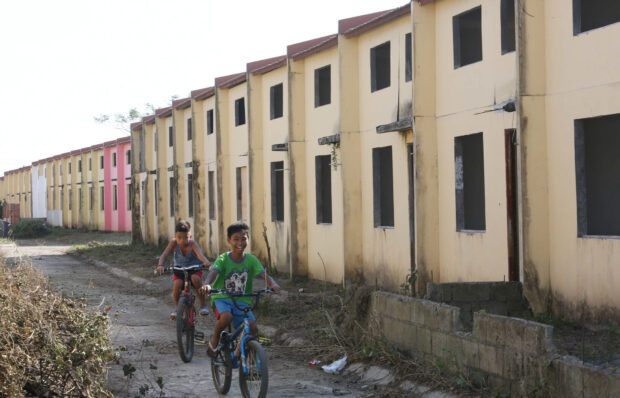What to do with government housing units still empty?

IDLED PROJECT | This National Housing Authority project in Ibaan, Batangas, was constructed between 2016 and 2017 but was still unfinished when this photo was taken on Jan. 30, 2020. (File photo by MARIANNE BERMUDEZ / Philippine Daily Inquirer)
MANILA, Philippines — Noting that tens of thousands of socialized housing units remain unoccupied long after they were awarded to the beneficiaries, Pinuno Rep. Ivan Howard Guintu is pushing to empower the government to take back these idle homes.
House Bill No. 9258 proposes amending Presidential Decree No. 757, or the law creating the National Housing Authority (NHA), to give the agency more teeth in revoking the award of socialized housing units to owners who don’t immediately move in.
Guintu filed the measure in September. It is pending before the House Committee on Housing and Urban Development.
In his bill’s explanatory note, Guintu cited data from the NHA which showed that 22,635 housing units were awarded but remained unoccupied or vacant as of June 2022.
“The substantial number of unoccupied or abandoned housing units of the NHA calls for measures to ensure that housing units are awarded and utilized by qualified and deserving beneficiaries who will use and occupy the same,” the lawmaker said.
Article continues after this advertisementPinunu stands for “Pinatatag na Ugnayan para sa mga Oportunidad sa Pabahay ng Masa.”
Article continues after this advertisementUnoccupied for 1 year
Under PD 757, signed by then President Ferdinand Marcos Sr. in 1975, no provision allows the NHA to revoke the award of housing units to beneficiaries or to evict beneficiaries who fail to pay the amortization for housing units.
The NHA is the sole national agency mandated to engage in housing production for low-income families. In February 2019, it was placed under the administrative supervision of the newly created Department of Human Settlements and Urban Development.
In HB 9258, Guintu proposed adding a new provision in the NHA charter authorizing it to “revoke the award of beneficiaries of unoccupied and abandoned socialized housing units.”
A housing unit that remains unoccupied and abandoned for at least a year since being awarded to the beneficiary or has been abandoned for at least a year upon occupancy will be taken back by the government, according to the bill.
The measure also proposed authorizing the NHA to revoke the award if the housing unit is occupied by another party who is neither the original beneficiary nor any member of his or her household.
Inventory
The NHA will then transfer the housing unit to the actual occupants and will return a “reasonable portion of the amortization payments” to the original beneficiary, the bill states.
HB 9258 also proposed that the NHA and local government units conduct an inventory of unoccupied and abandoned socialized housing units.
In March, Guintu filed House Resolution No. 838 pressing the NHA to take back around 18,000 low-cost housing units that were unoccupied or abandoned and to award these to other beneficiaries.
He stressed the need for the NHA “and other key shelter agencies to conduct an inventory of unoccupied and abandoned housing units for the awarding to qualified homeless and informal settler families to prevent wastage of money.”
Flagship program
President Marcos has made low-cost socialized housing as one of his legacy flagship programs.
The administration’s “Pambansang Pabahay Para sa Pilipino Program” is targeting the construction of one million homes each year until 2028 to address the Philippines’ overall housing backlog of 6.7 million homes as of 2021.
In March 2017, the Kalipunan ng Damayang Mahihirap (Kadamay), an urban poor group, occupied about 6,000 socialized housing units in Bulacan province meant for resettlement communities and government uniformed personnel.
This drew the ire of then-President Rodrigo Duterte, who threatened to shoot down the informal settlers.
But a month later, he asked the original beneficiaries, including soldiers and police officers, to let the occupants stay, vowing to build better homes for them elsewhere. The Kadamay members have since settled into the community.